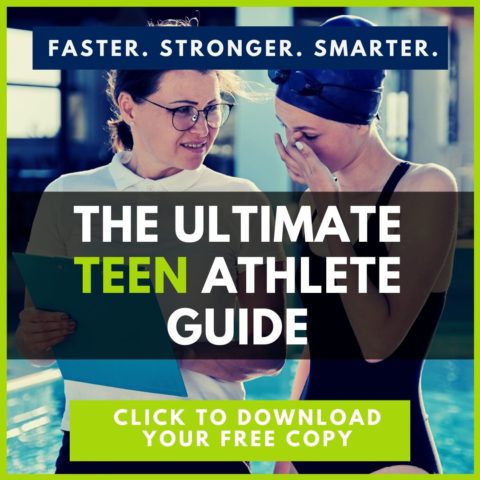Courtesy: P2Life
Swimmers, especially competitive swimmers, know the importance of fueling themselves with the right nutrition to get the best benefits from their training. But what about the importance of sleep? Do you actually need to be hitting a magic number every night, or is it something you can catch up on? Sleep is an often-overlooked but essential element of a solid training plan and one which, if not properly budgeted for, can wreak havoc on your training and sabotage your performance and overall health. Read on to find out why you should be paying attention to your sleep schedule as part of your training, and how to get better quality sleep in uncertain times where pandemic anxiety has fueled a new wave of insomnia, aptly named ‘coronasomnia’.
Why is sleep important for performance?
Sleep is important for everyone, but athletes need more sleep than most. Not getting sleep, or not getting enough sleep, impairs cognitive performance, appetite regulation as well as glucose metabolism. Researchers recommend the average adult should aim to get 8 hours of sleep each night to prevent neurobehavioral deficits.
The body repairs itself while we sleep, and REM sleep provides energy to the body and the brain. Cutting sleep short means the body won’t have sufficient time to repair muscle tissue, memory, consolidate memory, or release necessary hormones, such as growth hormones, which provide optimum conditions for anabolism and energy storage. Not getting enough sleep may mean waking up feeling tired, stiff, and under-recovered, which is a recipe for a pain-train-themed practice, and if repeated enough could increase your risk for injury and illness.
How much sleep do you need to prime your body for strain?
Getting 8 hours of sleep every night is recommended for the average adult, but with the rigorous training athletes push through, they need more than average. “Just as athletes need more calories than most people when they’re in training, they need more sleep too,” according to Davide Geier, MD, an orthopedic surgeon and sports medicine specialist in Charleston, SC. Adding an extra hour of sleep onto the standard recommendation of 8 hours, or to add the extra hour as a nap is advised to help athletes get enough time for their bodies to recover and prepare to take on the pressures of the next day.
What happens when you don’t get enough sleep?
Sleep deprivation leads to a decrease in the production of glycogen and carbohydrates, which are stored for energy use during physical activity. Not getting enough sleep reduces the chances of training with fully replenished glycogen stores, and increases the chance of fatigue, reduced energy levels, and diminished concentration and focus. Sub-optimal glycogen levels can also slow down recovery post-training, or competition. Poor quality sleep also negatively impacts the immune system, as it interferes with certain proteins, such as cytokines, which are involved in mediating and regulating immunity, inflammation, and hematopoiesis (production of blood cells and platelets).
Will sleep directly impact my athletic performance?
Multiple studies have been conducted and highlight the impacts of sleep for athletes, and the conclusion is that adding that extra hour onto your rest time is well worth it. Research conducted by Mah et al (2011), found that by increasing the sleep time for swimmers to 10 hours each night for six to seven weeks resulted in significant improvements in reaction times, 15 meter sprint times, turn times as well as overall mood improvements. Stanford University researched what would happen if their basketball team added an average of 2 hours more sleep to their schedule for several months, and found the speed of their players increased by 5%, and the accuracy of their free throws improved by 9%.
Quality, not just quantity:
In addition to getting the recommended 9 hours of sleep, athletes should be mindful of the quality of sleep they’re getting. Changes in routines, extra screen time on Zoom, FaceTime and news and social media scrolling, and additional anxiety have been negatively impacting sleep patterns across the globe. Early studies are suggesting a 37% increase in the rates of clinical insomnia. Health professionals have labeled this “coronasomnia”. While a single night of bad rest is nothing to worry about, if you find yourself getting into a bad sleep pattern, or would like to improve the quality of your sleep, there are a few tips that can help set you up for sleep success.
Sleep soundly with these tips:
1) Schedule in sleep like you schedule your workouts, block it out on your calendar, and aim to get the recommended 9 hours. It’s recommended to go to bed and wake up at the same time every day to set your circadian rhythm.
2) Avoid caffeine and alcohol, which can wreak havoc on your nutrition goals and cause sleep disturbances, as well as diminish the quality of your sleep.
3) Try to reduce the amount of blue light from screens, especially close to bedtime. Try to put down the phone and stop scrolling about 1 hour before bedtime. UC Davis’s Clinical Professor Angela Drake, of the Department of Psychiatry and Behavioral Sciences, has found she’s had to limit the consumption of news and social media for several of her patients, in order to reduce anxiety, and increase sleep duration and improve sleep quality.
4) Try to wake up with the sun or open the blinds as soon as you wake up to keep your body in normal circadian rhythms.
5) Try one of the many meditation apps, and try a 5-10 minute meditation before going to sleep to prime your body for good rest. There are also meditations that can be helpful for athletes to get frame their goals, focus, and get into a positive mindset before training and competitions.
6) Having a nutritious, easily digestible, snack before bedtime not only provides your body with the much-needed nutrients to jumpstart recovery but it also ensures your body won’t need to seek out nutrients from other sources, such as by breaking down muscle tissue. A delicious nutritious shake, like P2Life’s NutriBoost shake, which contains roughly 70% of the vitamins and minerals, as well as important macro-nutrients such as protein, can have you waking up the next day feeling energized and fully recovered. In addition, P2Life’s NutriBoost Shake contains magnesium, which has sedative properties and has been shown to improve sleep quality in people with poor quality sleep. Vitamin D has also been correlated with better sleep quality, although the jury is still out about whether there is any causation.
Sources:
- (Van Dongen et al., 2003). The Cumulative Cost of Additional Wakefulness: https://www.med.upenn.edu/uep/user_documents/dfd16.pdf
- Slow-wave sleep: A recovery period after exercise. CM Shapiro et al. 1981 http://www.sciencemag.org/content/214/4526/1253.abstract
- Spiegel, Leproult and Van Cauter, Impact of sleep debt on metabolic and endocrine function. The Lancet (1999;354:1435-1439). – http://www.ncbi.nlm.nih.gov/pubmed/10543671
- Mah CD; Mah KE; Kezirian EJ; Dement WC. “The effects of sleep extension on the athletic performance of collegiate basketball players.” – SLEEP 2011;34(7):943-950. http://www.ncbi.nlm.nih.gov/pmc/articles/PMC3119836/
- https://health.ucdavis.edu/health-news/newsroom/covid-19-is-wrecking-our-sleep-with-coronasomnia–tips-to-fight-back-/2020/09
- https://www.ncbi.nlm.nih.gov/pmc/articles/PMC7274952/
- https://examine.com/supplements/magnesium/
- https://examine.com/topics/sleep-quality/
- https://examine.com/nutrition/can-supplemental-vitamind-improve-sleep/
- https://www.nhlbi.nih.gov/news/2020/covid-and-sleep-better-slumber-during-pandemic-may-help-protect-your-health
About P2Life
P2Life is a family-owned, performance-based, nutritional supplement company that was designed for swimmers, by swimmers, to protect health and promote performance. Within one year of launching, P2Life was the preferred choice for 40% of the USA Men’s National Swim at the London Olympics. Today P2Life is the dominant force in nutrition and is tried, tested, and loved by elite and aspiring athletes across all levels; high school, collegiate and masters swimmers around the globe. Every P2Life product is independently batch tested to be certified free of banned and illegal substances. P2life products have undergone +35 years of rigorous research and development, and the difference they make is evident in the numbers. With 18 Olympic medals, +800 World Records, and +100 National Age Group Records and counting, it’s clear that P2Life athletes feel the difference.
P2Life was founded by Tim Shead, a Masters Swimming Hall of Fame Inductee and +45x World Record Holder, and co-founded by Michael Shead, a former national water polo player. Tim’s expertise in swimming and years of experience and knowledge working with nutritional products, combined with Michael’s love of innovation and technical background, has enabled the P2Life team to create a technologically savvy company that is dedicated to furthering athletic potential. P2Life strives to empower athletes with the highest-quality nutritional supplements, backed by peer-reviewed scientific research, and to arm athletes and their loved ones with accurate and reliable information to make informed decisions. The whole P2Life team is working to fuel the athletes of today and tomorrow for a bright future, in which dreams become achievable goals and sustainable realities.
FOLLOW P2LIFE ON INSTAGRAM HERE
FOLLOW P2LIFE ON FACEBOOK HERE
P2Life is a SwimSwam partner.




Hard to sleep 8-9 hours as a high school athlete with doubles almost every day and homework to keep up with as well
Homework is an abomination, and if I were king it would be outlawed in a day. Kids sit in school for seven hours a day, the teachers don’t get to control the rest of their lives.